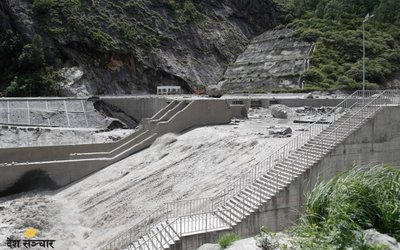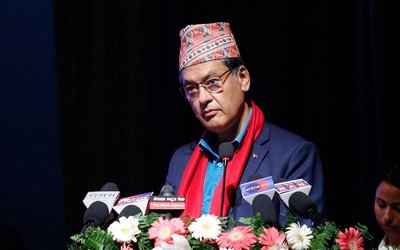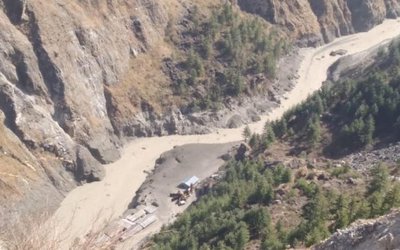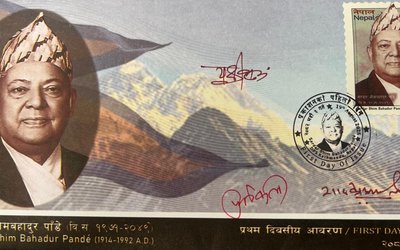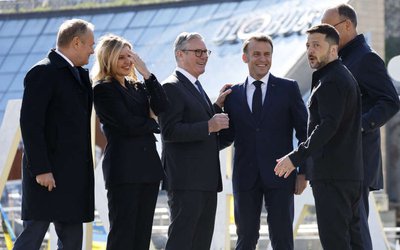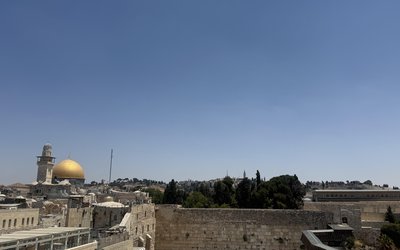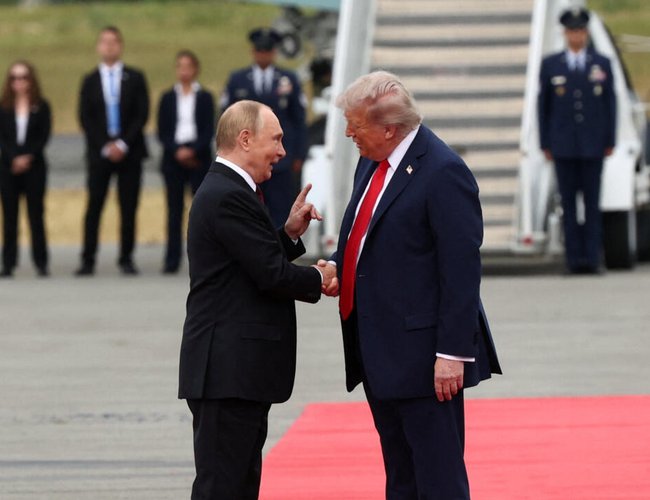
Red Carpet on the Ice
Russian President Vladimir Putin’s Il-96 touched down at Joint Base Elmendorf-Richardson under an Arctic light, its wings slicing through icy sky. On the tarmac, U.S. President Donald Trump waited beside an L-shaped red carpet flanked by four F-22 Raptors—a tableau of American muscle. As Putin descended the stairs, he offered a calculated grin: "Good afternoon, dear neighbour." The greeting was geopolitics distilled: Alaska, sold by Russia for $7.2 million in 1867, now staged a summit where two iconoclasts would redraw the world order over abandoned lunch menus and nuclear tensions.
The Theatre of Power: Stagecraft Over Statecraft
The choreography screamed symbolism. Putin bypassed his Aurus limousine to ride with Trump in "The Beast," their motorcade driving past B-2 Stealth Bombers toward a concrete conference room. Outside, Indigenous Sami protesters braved subzero winds, their chants drowned by fighter jets. Inside, the script frayed: a planned three-course luncheon (filet mignon, halibut Olympia, crème brûlée) lay abandoned. So too, the pretence of European inclusion. No EU flags draped the hangars; no Macron or Merz haunted the corridors. Only Lavrov’s USSR sweatshirt—a not-so-subtle troll beneath his parka—hinted at the ideological chasm.
Trump’s Truth Social decree—"PEACE THROUGH STRENGTH!"—had detonated hours earlier. The Kremlin’s retort, colder than the Bering Strait: "Dialogue is necessary."Translation: We hold the cards. Europe’s neutrality lay buried here: Swiss vaults hoard part of the seized $300 billion in Russian sovereign assets; Finland’s NATO entry planted U.S. artillery 30 miles from St. Petersburg. Alaska, once "Seward’s Folly," now guarded the Arctic’s eastern choke point—where 30% of Earth’s undiscovered gas slept under melting ice.
The Unspoken Bargain: Menus and Missiles
For three hours, the leaders haggled in a windowless room. Putin, fresh from Tsirkon hypersonic tests in the Barents Sea, demandedDonbas and Crimea, NATO renunciation, and the unfreezing of $300 billion in sovereign Russian assets. Trump countered with grain corridors for famine-ravaged nations and joint Arctic drilling rights. No OSCE observers monitored; no IAEA inspectors verified. The only witnesses: a ceremonial bald eagle statue—Trump’s gift—and Steve Witkoff, the envoy recently awarded Putin’s Order of Lenin.
Outside, half the world away, the proxy war raged on. Kharkiv shuddered under drone strikes; Rostov’s borders bled. Yet inside, the calculus was clinical:
Trump’s clock: Midterms loomed in 2026; a "victory" could cement legacy.
Putin’s pain: Sanctions straining Russia’s GDP, with China’s Xi eyeing Arctic shipping lanes for Belt and Road tankers.
When they emerged, no ceasefire graced the podium. Only Putin’s smirk and Trump’s vagueness: "Great progress! ... No deal until there’s a deal." The subtext? Ukraine’s fate would be decided in trilateral talks—without Europe.They will meet again; in Minsk?
The Global South Gaze: Beyond the Western Echo Chamber
While Brussels scrambled for damage control, perspectives from Delhi to Nairobi cut through the noise. India’s Foreign Ministry praised the summit as "highly commendable leadership in the pursuit of peace"—a nod to multipolar diplomacy. In energy markets, analysts noted Russia’s pivot: discounted oil flowing to India and China, yuan-denominated contracts bypassing dollar sanctions. BRICS, swelled by Saudi Arabia and UAE’s entry, now commanded 25% of global oil—with petro-yuan trades hitting 24% of daily Brent volumes.
"When the system exiles you, shatter the system," observed a Nairobi financier, tracking mBridge CBDC transactions that skirted SWIFT. For Global South nations, Alaska underscored a hard truth: Western institutions were no longer arbiters. The real leverage lay in tankers—grain, gas, and gold.
Europe’s Permafrost Exile: Coalition of the Willing or Fractured of the Weak?
Europe’s response was a study in dissonance. Germany’s Merz insisted "security guarantees are on the table," while Macron warned of Russia’s "well-established propensity to fail commitments." A frantic video call birthed a joint statement: ironclad guarantees for Ukraine, no Russian veto on NATO accession. Yet beneath the unity, fissures spread. Poland lunged for nuclear-sharing deals; France touted "strategic autonomy"; Hungary’s Orbán declared the world "safer"—a stark contrast to Sweden’s alarm over "bad peace on Russia’s terms".
The brutal takeaway? Europe was reduced to a spectator. As Slovak PM Fico scoffed, "The unsuccessful European strategy of weakening Russia through incredible assistance to Kiev must end." Alaska had exiled them—absolutely.
Final Act: The New Compass: Power Is Terrain
The summit forged no peace, but it shattered old axioms. As Putin invited Trump to Moscow—switching to English—"Next time, in Moscow!"—the globe’s power coordinates shifted:
Arctic Dominance: Russia’s Northern Sea Route, patrolled by Tsirkon-armed icebreakers, now rivals Suez. U.S.-Rosneft Kara Sea ventures (6.2B tons of oil) thaw sanctions via joint drilling.
Institutions as Tombs: The G20 echoes emptily; the Arctic Council fractures. Real deals ignite where warheads sleep—in silos or aboard Putin’s jet.
Legitimacy as Leverage: West’s $300 billion frozen assets may buy grain for Ethiopia. BRICS dangles petro-yuan for UN votes. Ideals bow to cargo manifests.
After The Flashbulbs: Silence Over the Tundra
When the motorcades departed, hotel staff at the Captain Cook found eight pages in a business-centre printer. Sensitive documents—meeting rooms, phone numbers, even phonetic guides to "POO-tihn"—abandoned beside a salad menu. The oversight epitomised the moment: high-stakes diplomacy reduced to bureaucratic farce.
For the Global South, Alaska’s lesson is clear. The glaciers melted not to nourish, but to bare the planet’s scorched bedrock: raw power, ungoverned and unadorned. As India’s Randhir Jaiswal noted, "The way forward is only through dialogue"—but now, the dialogue belongs to those who command terrains, not treaties.
Zakir Kibria is a Bangladeshi writer, policy analyst and entrepreneur based in Kathmandu. He can be reached at zk@krishikaaj.com
Originally published by the Dhaka Tribune (Bangladesh), 19 August 2025. Republished in New Spotlight Magazine with permission. The views expressed in the article are those of the authors and do not necessarily reflect the view of the New Spotlight.Full Link: https://www.dhakatribune.com/opinion/op-ed/389348/the-alaska-table-where-thawing-ground-rewrites
- The Tehran Gambit: How America’s War on Iran Accelerated the Birth of a Post-Western World
- Aug 05, 2025
- The Digital Strip Search: How America’s Social Media Visa Edicts Redraw Colonial Borders in Cyberspace
- Jul 14, 2025
- The Iron Silk Road: How a Train to Tehran is Rewriting The World’s Map – And Why The Old Powers Are Terrified
- Jun 25, 2025
- The Kuala Lumpur Pivot: How A Silent Summit In Malaysia Is Rewriting The Global Economic Map
- Jun 16, 2025
- The Rise of Mediation Diplomacy – How Hong Kong’s IOMed Charts a New Path for a Multipolar World
- May 28, 2025

